Oluwabusayo Olufunke Awoyomi
AfriMTE and AfriCOMET: Empowering COMET to Embrace Under-resourced African Languages
Nov 16, 2023
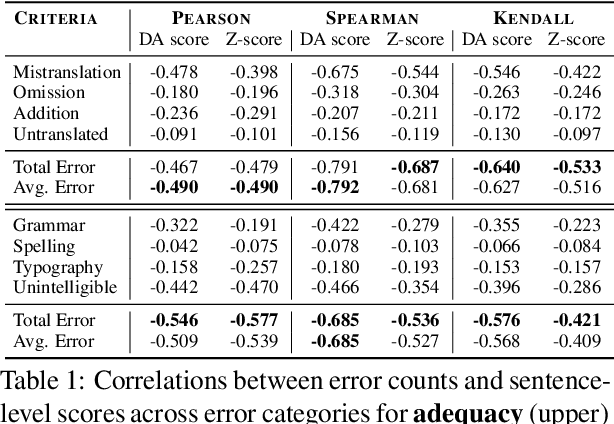
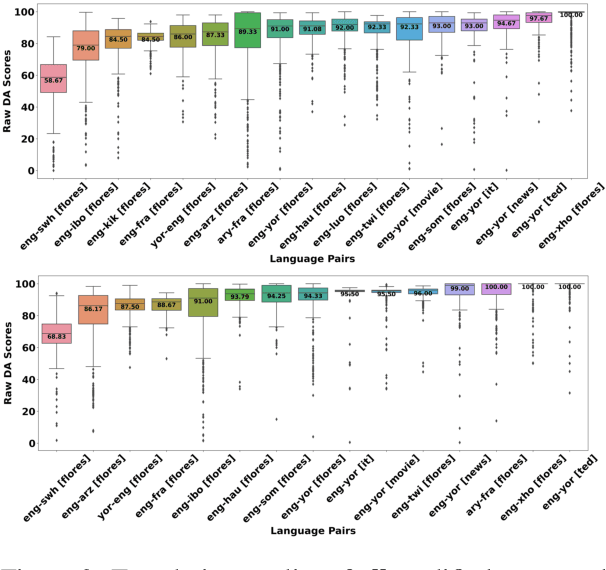
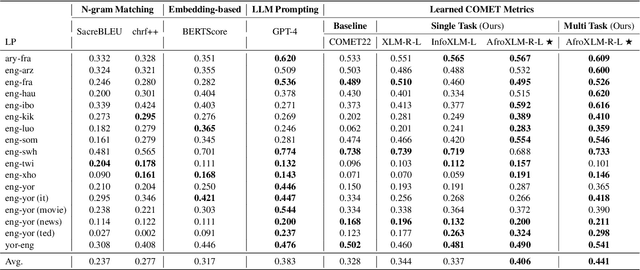
Abstract:Despite the progress we have recorded in scaling multilingual machine translation (MT) models and evaluation data to several under-resourced African languages, it is difficult to measure accurately the progress we have made on these languages because evaluation is often performed on n-gram matching metrics like BLEU that often have worse correlation with human judgments. Embedding-based metrics such as COMET correlate better; however, lack of evaluation data with human ratings for under-resourced languages, complexity of annotation guidelines like Multidimensional Quality Metrics (MQM), and limited language coverage of multilingual encoders have hampered their applicability to African languages. In this paper, we address these challenges by creating high-quality human evaluation data with a simplified MQM guideline for error-span annotation and direct assessment (DA) scoring for 13 typologically diverse African languages. Furthermore, we develop AfriCOMET, a COMET evaluation metric for African languages by leveraging DA training data from high-resource languages and African-centric multilingual encoder (AfroXLM-Roberta) to create the state-of-the-art evaluation metric for African languages MT with respect to Spearman-rank correlation with human judgments (+0.406).
MasakhaNEWS: News Topic Classification for African languages
Apr 19, 2023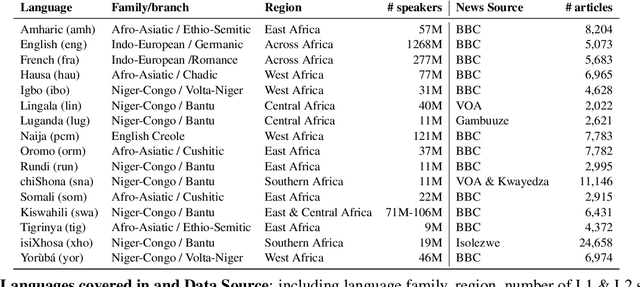
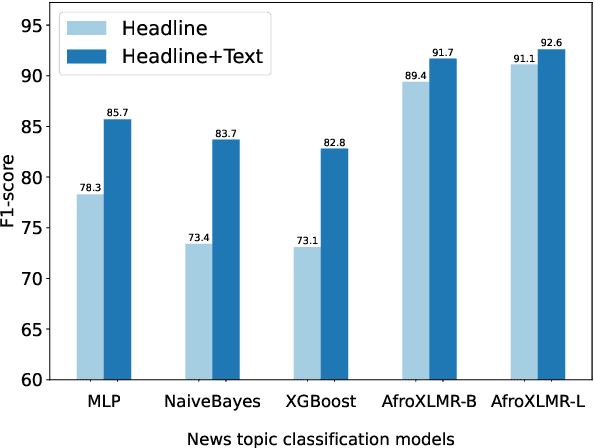
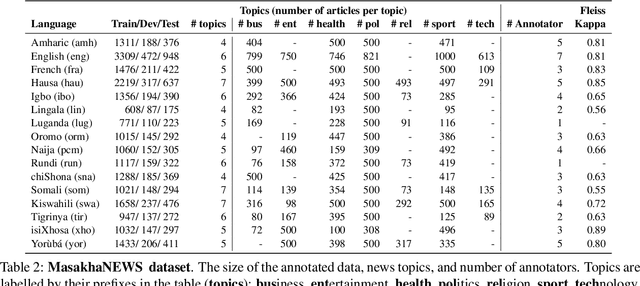
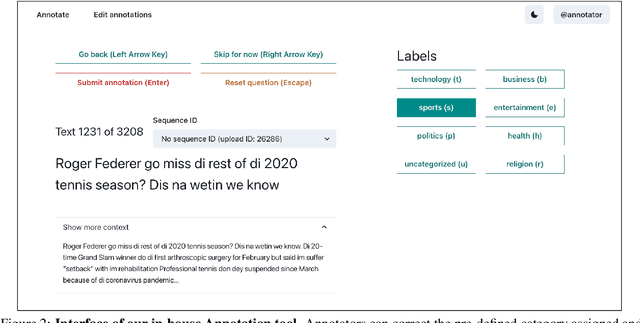
Abstract:African languages are severely under-represented in NLP research due to lack of datasets covering several NLP tasks. While there are individual language specific datasets that are being expanded to different tasks, only a handful of NLP tasks (e.g. named entity recognition and machine translation) have standardized benchmark datasets covering several geographical and typologically-diverse African languages. In this paper, we develop MasakhaNEWS -- a new benchmark dataset for news topic classification covering 16 languages widely spoken in Africa. We provide an evaluation of baseline models by training classical machine learning models and fine-tuning several language models. Furthermore, we explore several alternatives to full fine-tuning of language models that are better suited for zero-shot and few-shot learning such as cross-lingual parameter-efficient fine-tuning (like MAD-X), pattern exploiting training (PET), prompting language models (like ChatGPT), and prompt-free sentence transformer fine-tuning (SetFit and Cohere Embedding API). Our evaluation in zero-shot setting shows the potential of prompting ChatGPT for news topic classification in low-resource African languages, achieving an average performance of 70 F1 points without leveraging additional supervision like MAD-X. In few-shot setting, we show that with as little as 10 examples per label, we achieved more than 90\% (i.e. 86.0 F1 points) of the performance of full supervised training (92.6 F1 points) leveraging the PET approach.
AfroLM: A Self-Active Learning-based Multilingual Pretrained Language Model for 23 African Languages
Nov 07, 2022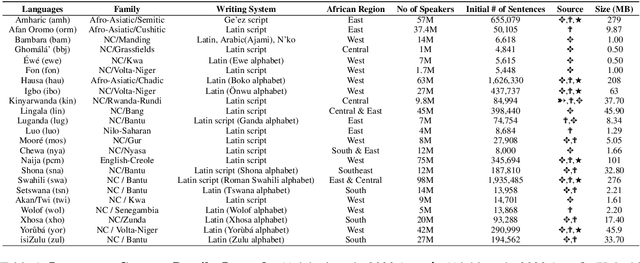
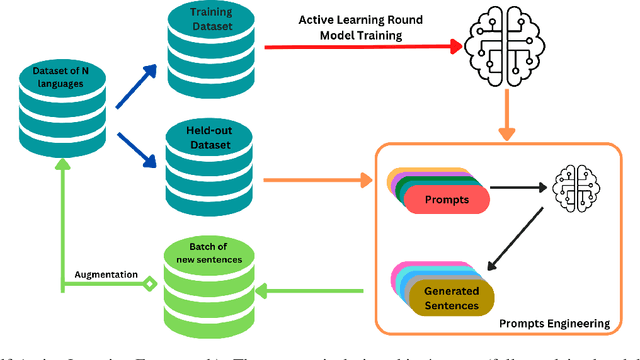
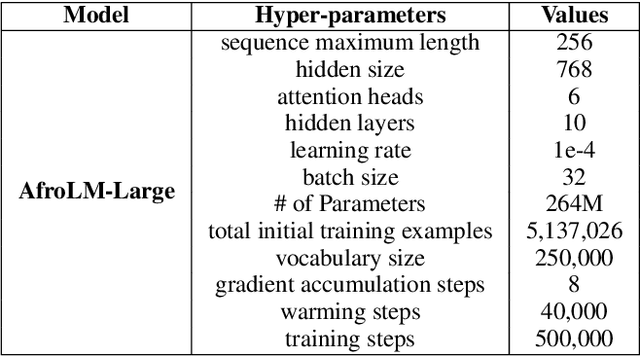
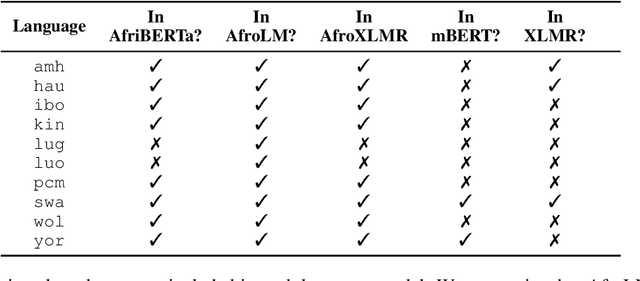
Abstract:In recent years, multilingual pre-trained language models have gained prominence due to their remarkable performance on numerous downstream Natural Language Processing tasks (NLP). However, pre-training these large multilingual language models requires a lot of training data, which is not available for African Languages. Active learning is a semi-supervised learning algorithm, in which a model consistently and dynamically learns to identify the most beneficial samples to train itself on, in order to achieve better optimization and performance on downstream tasks. Furthermore, active learning effectively and practically addresses real-world data scarcity. Despite all its benefits, active learning, in the context of NLP and especially multilingual language models pretraining, has received little consideration. In this paper, we present AfroLM, a multilingual language model pretrained from scratch on 23 African languages (the largest effort to date) using our novel self-active learning framework. Pretrained on a dataset significantly (14x) smaller than existing baselines, AfroLM outperforms many multilingual pretrained language models (AfriBERTa, XLMR-base, mBERT) on various NLP downstream tasks (NER, text classification, and sentiment analysis). Additional out-of-domain sentiment analysis experiments show that \textbf{AfroLM} is able to generalize well across various domains. We release the code source, and our datasets used in our framework at https://github.com/bonaventuredossou/MLM_AL.
 Add to Chrome
Add to Chrome Add to Firefox
Add to Firefox Add to Edge
Add to Edge